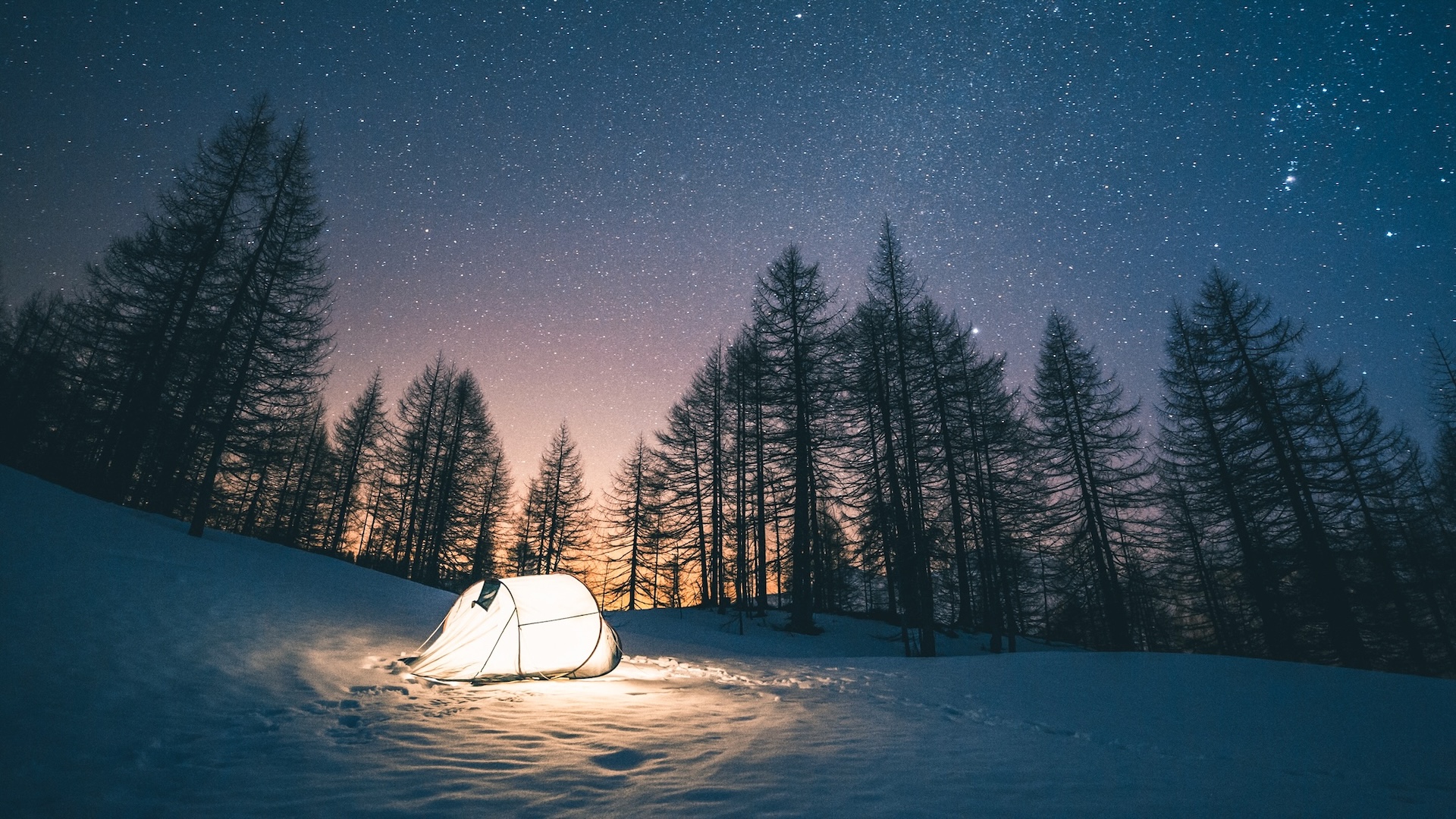
Camping in winter? While it might not sound like the most attractive idea – especially when you think of the warm days and evenings of summer – a winter camping adventure can bring some great rewards. The secret to making a winter camping trip enjoyable is to make sure you stay warm and dry, even when temperatures plummet.
Why go winter camping?
Many people pack away their tent and sleeping bag and push their backpack to the back of the cupboard once the summer comes to an end. A few hardier souls will venture out for a few days of hiking and wild camping in autumn, when the chill starts to seep into the weather forecast, but, come winter, most people will be happier to stay at home in the easy warmth, or book a hostel or hotel for overnights during outdoor trips.
However, we reckon there are some good reasons for embarking on a winter camping adventure. If you enjoy the solitude of a wild camp, the winter is definitely for you. As we’ve already said, far fewer people go camping in winter, which means that even the most popular camp spots will be quiet, if not empty.
The landscape looks different, too, with a high chance of a frosty coat painting the ground a sparkly hue, or snow giving the vista a whole new bright blanket. Many people also rave about the winter light, especially the opportunity for beautiful sunrises and sunsets. For this reason, it’s a good idea to pack a camera or smartphone for taking photographs.
It’s also likely there will be opportunities to spot winter wildlife, or wildlife that adopts a different winter coat, so it’s also worth taking a pair of binoculars with you.
For the best winter camping experience, follow our expert tried-and-tested tips.
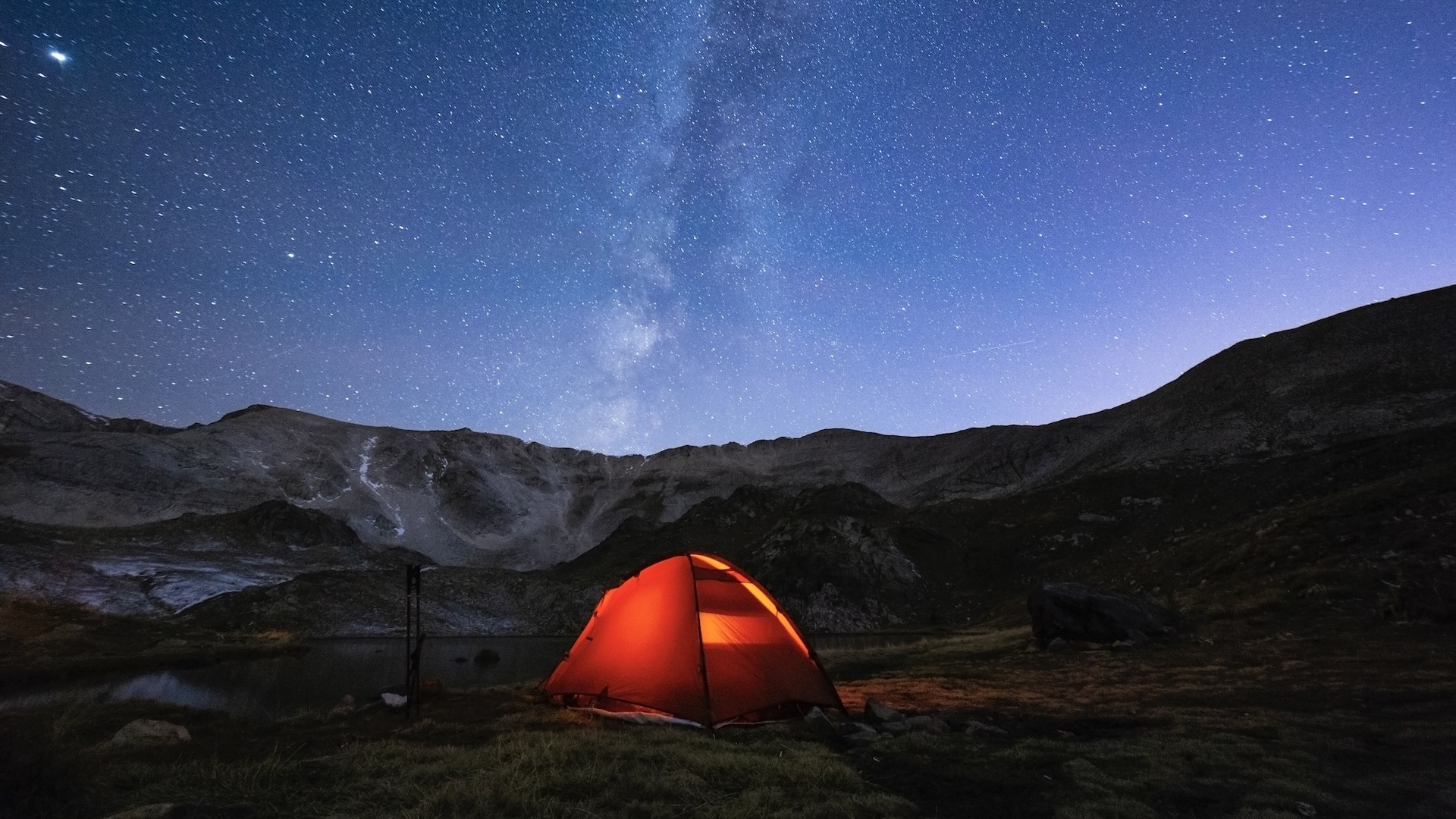
19 tips for enjoyable winter camping
1. Pick the right time in winter
Winter weather can be very variable so it’s wise to check the forecast for days and nights that will make your camping trip more enjoyable, rather than a trial of misery.
There are plenty of days in winter when it’s cold but with clear skies, or when winds are low and clouds are high. You might even be lucky enough to have a spell of sunshine and even if it’s icy or snowy, the joys of the warmer rays will make your adventure all the most pleasing.
Checking the forecast allows you to pack and plan accordingly for a camping trip.
2. Choose the right location
The right location, compared to the wrong location, will make or break a winter camping adventure. Winter conditions can be harsh at higher altitude, especially at night when temperatures drop further than the daytime.
Setting up camp at lower elevation, or trying to find shelter – such as in a forested area or away from the direction of the wind – will make a big difference to the experience when you pitch your tent.
3. Shorter and sweeter
If you enjoy multi-day and night backpacking and wild camping trips in the warmer seasons, one recommendation might be to shorten your adventures in winter. Perhaps a single night of winter camping will be enough to give you an outdoorsy boost.
It will depend on the weather and conditions, because sometimes the days of winter can be mild enough to head off for several days at a time, but while at other times the cold, wet and damp may well send you back home sooner.
Your winter camping backpack will also be heavier to carry because the colder conditions dictate the need for more equipment and clothing, so this might be another reason why you decide to keep the adventure to fewer days and nights, or a single night.
The best plan is to keep camping trips shorter in winter for a sweeter experience.
4. Pack the right tent
Tents are rated as two-, three- and four-season versions. This means they are usually progressively more durable against conditions such as high winds, rain and snow.
A tent that will survive all that winter weather can throw at it will have a high waterproof rating. This is measured as hydrostatic head (HH) and and the higher the HH the more waterproof the fabric will be. For example, highly waterproof fabrics will be up to HH 30,000mm.
Other features to look for include sturdier fabrics, stronger poles, robust tent pegs and plentiful securing points, as well as strong guy lines.
Four-season tents usually have a double-walled design, so they provide greater protection from the outside elements and they are likely to be designed as a lower profile than a summer tent so that the tent can withstand stronger winds.
Some winter tents, especially those meant for use in Alpine locations, will have a skirt that can be loaded with snow around the lower edge to keep the tent in place.
But whether you need a four-season tent or a three-season tent and kit for winter camping will depend on where you plan to go and as one of our reviewers discovered with a surprisingly robust three-season budget tent from Decathlon, you don’t always need to buy a new tent for winter.
It’s also worth noting that four-season tents tend to be heavier, compared to other tents, because they naturally have more and thicker fabrics and details.
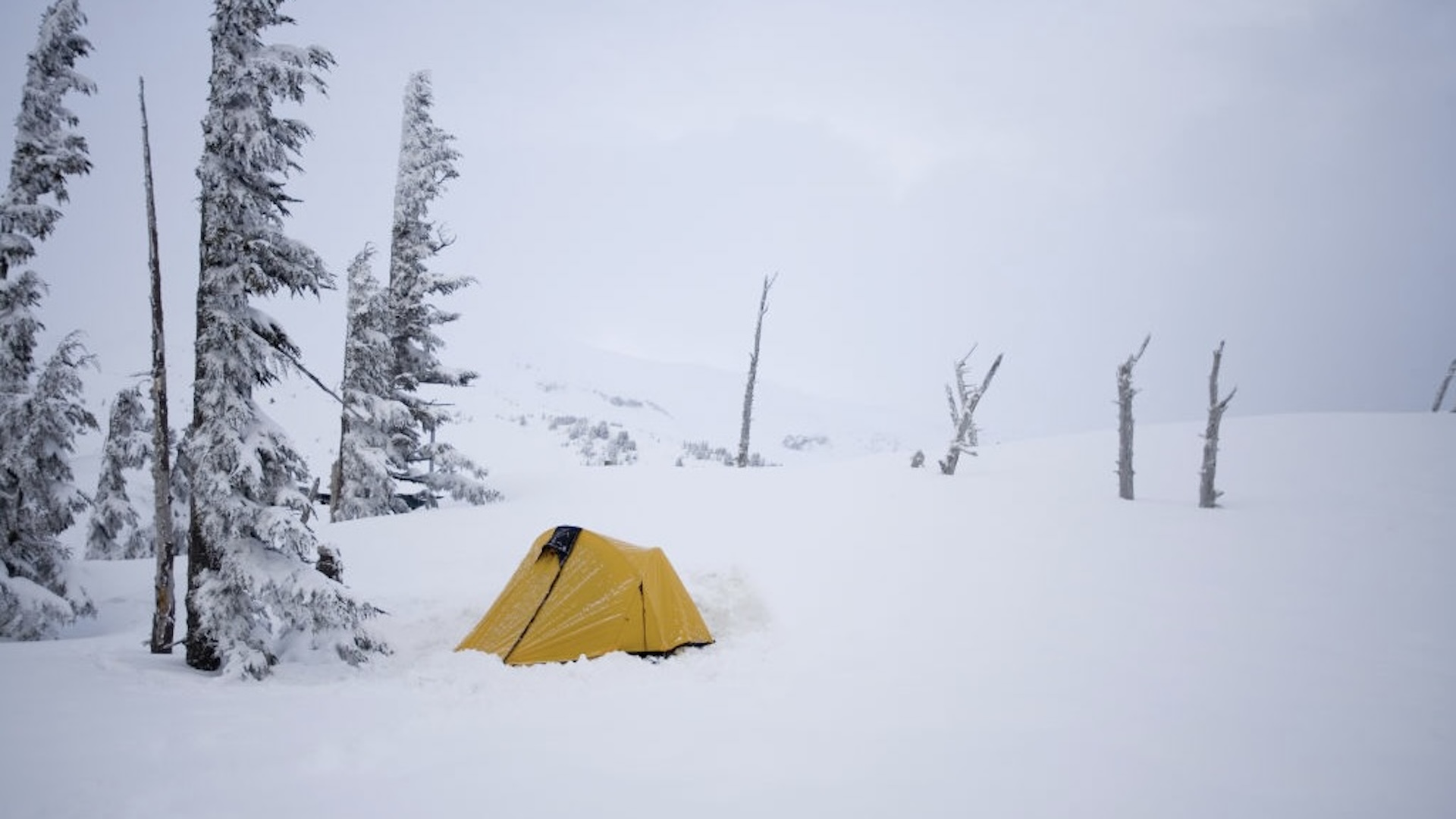
5. Tent pegs for winter
If the ground is frozen hard or covered in snow and ice, the average tent peg might not be sufficient. It’s a good idea to pack some more robust winter tent pegs so you can pitch your tent whatever the ground conditions.
If winds are stronger, and they can be fierce in winter, you’ll be grateful for as many tent pegs as you can carry so your main form of shelter doesn’t blow down or away.
6. Your sleeping bag will matter in winter
Whether you sleep warm or you would class yourself as a cold sleeper, the fact is the winter nights will be on average colder than summer nights. So, you should choose your sleeping bag carefully.
Again, bags are rated as two-season sleeping bags, three-season sleeping bags and four-season sleeping bags., with progressively more insulation and, therefore more warmth.
Other features might include water-resistant fabrics and insulation because the warmth of your body and the inside the tent, compared to the outside, causes condensation and damp.
A winter sleeping bag is likely to be bulkier and heavier than a summer sleeping bag but it’s worth carrying the extra weight if it means you will stay warm overnight. Shivering inside a tent all night is unpleasant at best and could prove dangerous at worst if it leads to hypothermia.
Adding a silk sleeping bag liner inside your sleeping bag can help to maintain heat at night, or you could double up two two-season bags for double the warmth.
7. A sleeping pad is a definite
In the summer, especially if you are trying to reduce the weight of your pack, you might decide not to bother with a sleeping pad. Some campers also prefer a camping hammock or a bivy sack to a tent.
But it’s easier to stay warm while winter camping in a tent and with a sleeping bag and a good quality sleeping pad, such as the Vaude Hike 9 sleeping pad or the Therm-a-Rest ProLite Women’s Sleeping Mat.
An inflatable sleeping bad creates an extra layer of insulation between you and the ground for a better night’s sleep.
8. Clothing layers and warmth
It’s common sense, but when you’re camping and hiking in winter, you’ll need more layers and warm clothes. Layering clothing allows for warmer air to be trapped between fabrics.
An insulated jacket for hiking and another one – such as a down-filled jacket – for evenings when at your camping spot will help to keep out the cold.
Other essentials are a windproof and waterproof jacket and over-pants. If you can create an outer layer of protection from rain and wind, you’ll maintain your core body temperature.
You should also take gloves, headwear and other winter items such as handwarmers.
Something warm and dry for wearing at night will be a bonus when temperatures drop and some campers like to take insulated camping slippers or woolly socks. If you have camped when it’s freezing outside, you will know just how much your feet can suffer in the middle of the night.
9. Camping gloves
If you are prone to cold hands – especially people with Raynaud’s Syndrome – a pair of gloves that you can wear while erecting your tent will be vital. The gloves need to allow for dexterity while putting poles together, finding the right pegs and sorting guy lines but they should also offer a layer of protection against a cold breeze, wind or low temperatures.
The chances are you will be pitching your tent as the sun sets, when temperates naturally drop, and after hours of hiking. This is when the body temperature will drop, too.
10. Camping system for cooking
In the winter, a warming meal and hot drinks will make a huge difference to the experience. Some summer hikers and campers may decide to save weight and the hassle of cooking by taking only cold foods and ready prepared snacks, plus water.
Your winter backpack should include a camping stove, pot, fuel, lighter and camping meals with plenty of calories for energy.
11. Pack more food than you might think
Winter hiking and camping can be tiring, especially if you are hiking through snow or faced with harsh weather conditions, and you may need more food than for summer hiking and camping trips. Pack extra snacks and perhaps a few energy gels and drinks to keep your energy up.
If you are tired and hungry, you may end up feeling colder and the aim on a winter camping trip is to stay as warm as possible.
12. Don't delay getting out of your damp clothes
After a day of hiking, even in cold conditions, you will have created sweat and this leads to damp clothes. Damp clothing will then lead to a chill. The best base layers are made of quick drying fabrics but you should still aim to beat the damp by changing out of sweaty clothing and into something dry before you set up camp.
This does mean you need to take extra clothing with you for winter camping trips but it will make a big difference to your enjoyment.
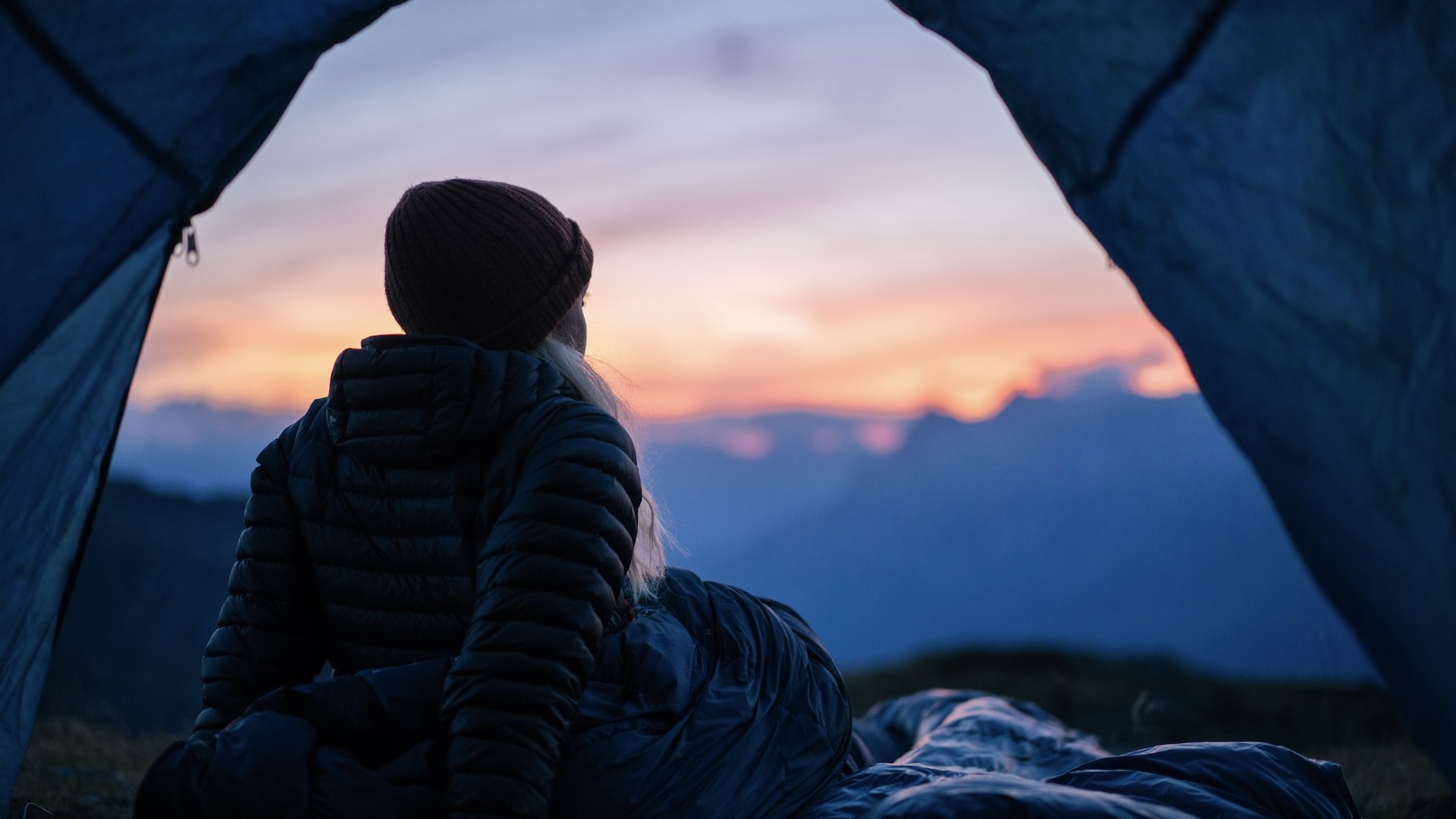
13. Extra heat sources at night
Packing a small hot water bottle and filling it up with boiled water before you climb into your sleeping bag can be a great benefit for getting off to sleep. It might be that you make the effort to refill it during the night as well, if temperatures plummet.
Likewise, rechargeable handwarmers can be a real game changer.
14. Pop in a set of earplugs
Earplugs are not only useful for quietening the sound of a snoring partner or friend – they can also reduce the noise of the wind outside. It’s never easy to sleep when there are unusual sounds and the noise of the wind whooshing and whistling around the tent can lead to too many hours of being awake.
15. Gadgets for winter
Lower temperatures may lead to your phone battery or the rechargeable battery of a head lamp draining more quickly. To ensure you keep batteries topped up it’s a good idea to take a robust power bank with plenty of charging capacity.
16. Talking of head lamps...
Winter days are shorter, while nights are longer, so a head lamp or camping lantern will be a must-pack item.
17. Keep your footwear indoors
This writer once made the mistake of leaving a damp pair of shoes outside the tent overnight. The next morning, they were frozen solid and the first few hours of winter hiking the next day were very unpleasant and cold. Make sure you take your footwear inside the tent to protect it from the worst of the elements.
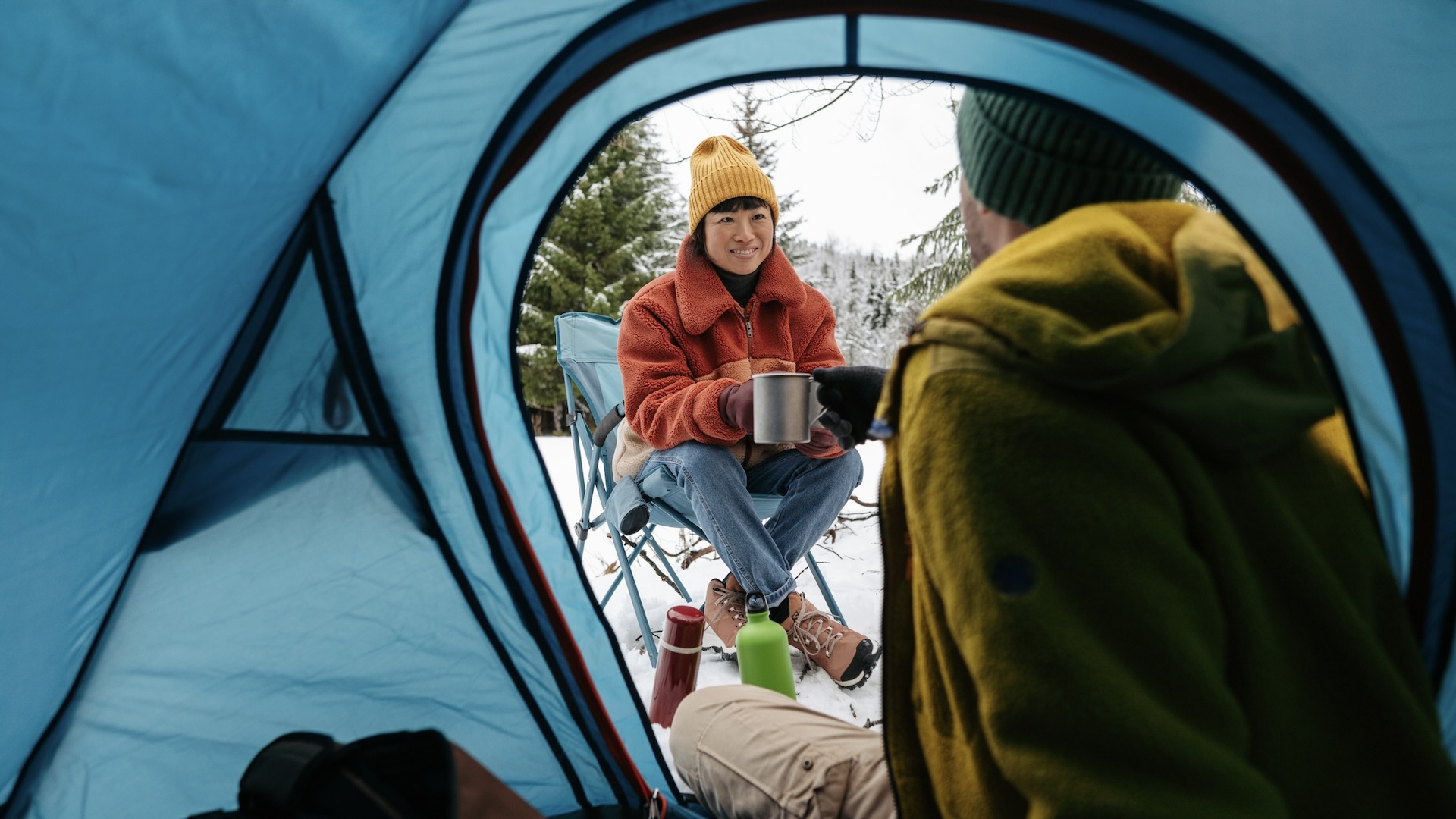
18. It's better with a friend
Winter camping has a few challenges but these can be easier to cope with if you are with a friend or partner. For example setting up a tent in the wind is made much easier with someone else pitching in.
It's also warmer if you share a tent with another person and you have someone else to share the load of carrying kit to a camping spot.
Winter outdoors adventures have more dangers, too, compared to the summer, so going with someone else means you can help each other if an accident occurs.
19. Don't let winter stop your camping
If you are the sort of person who loves spending time outdoors and enjoy a night or two under the stars, don’t let winter stop you in your tracks.







